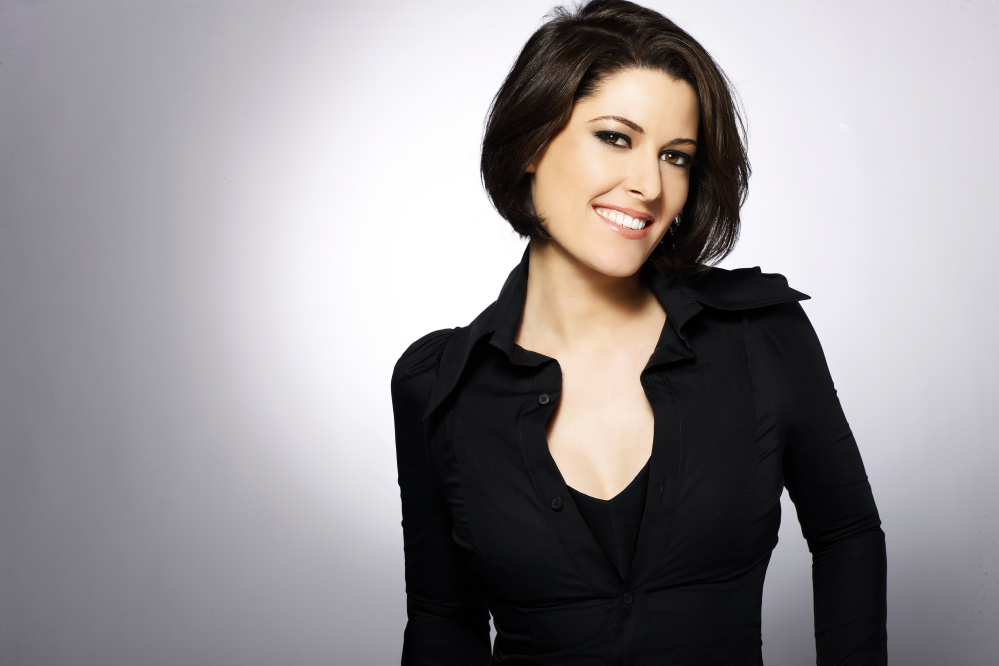Opera Maine‘s first presentation since renaming itself (from PORTOpera) was a recital by mezzo-soprano Kate Aldrich at Hannaford Hall on Saturday evening. The concert originally was scheduled for March 26, but a last-minute invitation from Plácido Domingo to fill in for an ailing singer in the cast of the Los Angeles Opera’s “Tales of Hoffmann” production led to a postponement. It was worth the wait: Aldrich is a superb performer who not only has a powerful, flexible voice, but is a master of inhabiting a character, whether on the opera stage or in a five-minute art song.
The concert was also a nice glimpse of the crossroads between local talent and international careers. Aldrich, who was born and raised in Damariscotta and now lives in Italy (and maintains a foothold in Maine), has performed in most of the world’s great opera houses, including the Met and La Scala. Martin Perry, Aldrich’s pianist on Saturday, is well-known to record collectors for several superb recordings of contemporary works (on the Bridge label), and splits his time between residences in Brunswick and New York.
I first heard Aldrich when she was a graduate student at the Manhattan School of Music, and sang the difficult title role in a 1998 student production of Handel’s “Ariodante.” She was already a commanding singer, confident in a range that took her from the lower reaches of the mezzo register, well into soprano territory. Some of the music on her recital program demanded a similar breadth, and 19 years after that first encounter, she still moves in both extremes with equal assurance.
There was another kind of range on display as well. Aldrich opened her program with a handful of dark pieces, in which the focus is on emotional depth, rather than on the considerable technique required to capture and convey the heartbreak, longing or devastation that drives the songs. The text of Ernest Chausson’s “Chanson Perpétuelle,” for example, is a lament for a lover who has moved on, in which the singer, at the brink of suicide, looks back at the earliest moments of the romance.
The four songs by Richard Strauss that Aldrich sang included “Befreit,” with a poem by Richard Dehmel in which a man tenderly takes leave of his dying wife.
But if you were looking for unvarnished technical display, Aldrich later offered that as well, in a pair of magnificently showy, densely ornamented Rossini arias – “Riedi al Soglio,” from “Zelmira,” and as an encore, “Una voce poco fa,” from “The Barber of Seville” – and in the “Habanera” from Bizet’s “Carmen,” one of her signature pieces. Aldrich sang the showpieces dazzlingly, with the vital characterization and clean, precise and often speedy ornamentation that can stop a show in the opera house.
Still, her renderings of the introspective works were her most affecting and memorable performances. In the Chausson, the Strauss songs and in her carefully shaped rendering of Berlioz’s “La Mort d’Ophélia,” on the second half of the program, Aldrich’s moment-by-moment manipulations of vocal weight and coloration created a perfect, and often fluid, balance of passion and despondency. And enveloping as her performances were, they left room for a listener to marvel afresh at the exquisiteness of Strauss’ gift for melody, and Berlioz’s innate sense of drama.
The program also included a zesty, spirited account of “Island Magic,” from Leonard Bernstein’s “Trouble in Tahiti,” and the amusing final monologue from Jake Heggie’s “Master Class.”
Pianists are often overlooked in vocal recitals, where they have the large but thankless task of providing support and helping create the context and atmosphere of each piece, without hijacking the spotlight. Perry did a fine job of that, both in the songs originally scored for piano and voice, and in his keyboard approximations of orchestral accompaniments.
Allan Kozinn is a former music critic and culture writer for The New York Times who lives in Portland. He can be contacted at:
allankozinn@gmail.com
Twitter: kozinn
Send questions/comments to the editors.



Success. Please wait for the page to reload. If the page does not reload within 5 seconds, please refresh the page.
Enter your email and password to access comments.
Hi, to comment on stories you must . This profile is in addition to your subscription and website login.
Already have a commenting profile? .
Invalid username/password.
Please check your email to confirm and complete your registration.
Only subscribers are eligible to post comments. Please subscribe or login first for digital access. Here’s why.
Use the form below to reset your password. When you've submitted your account email, we will send an email with a reset code.